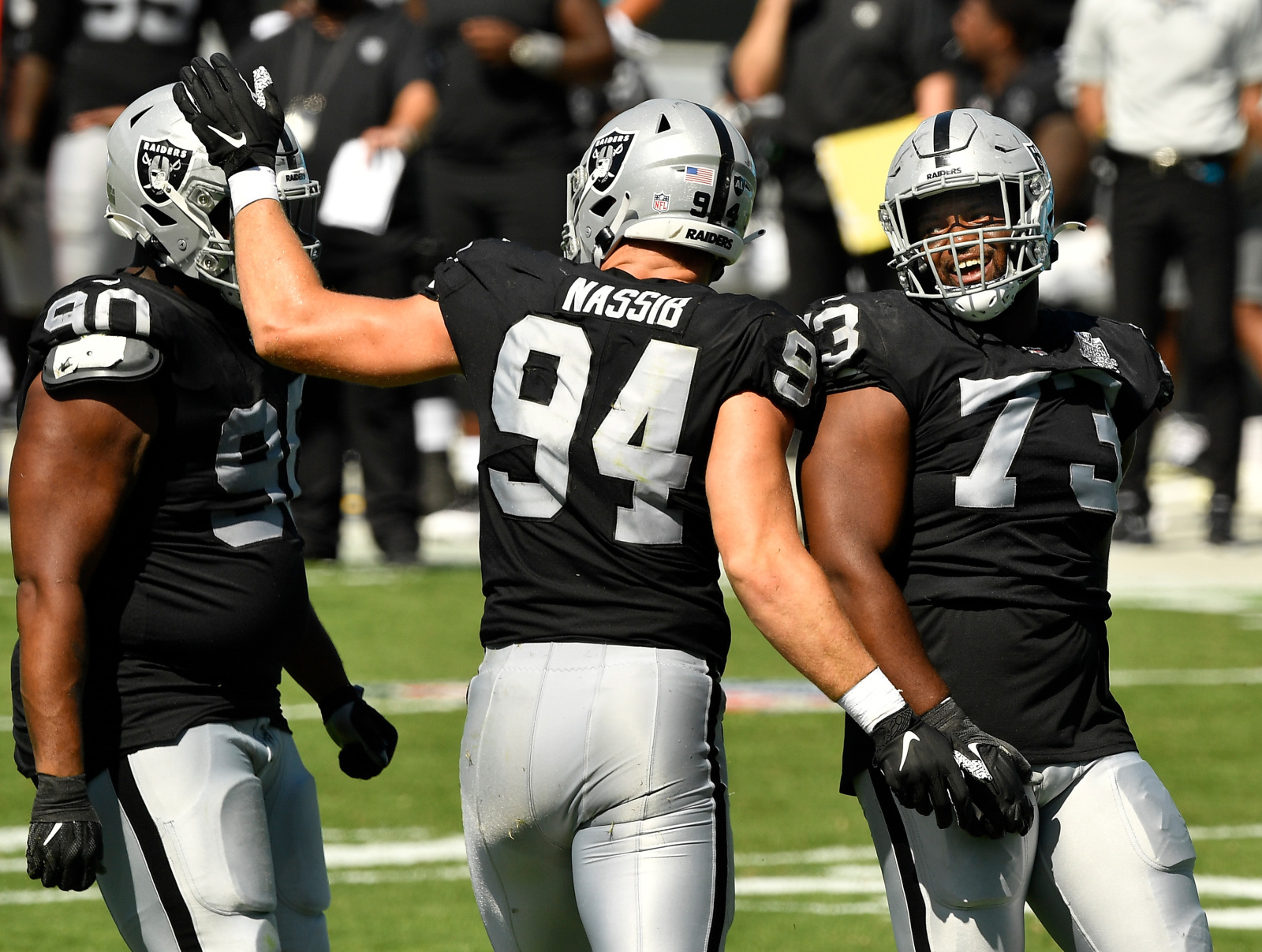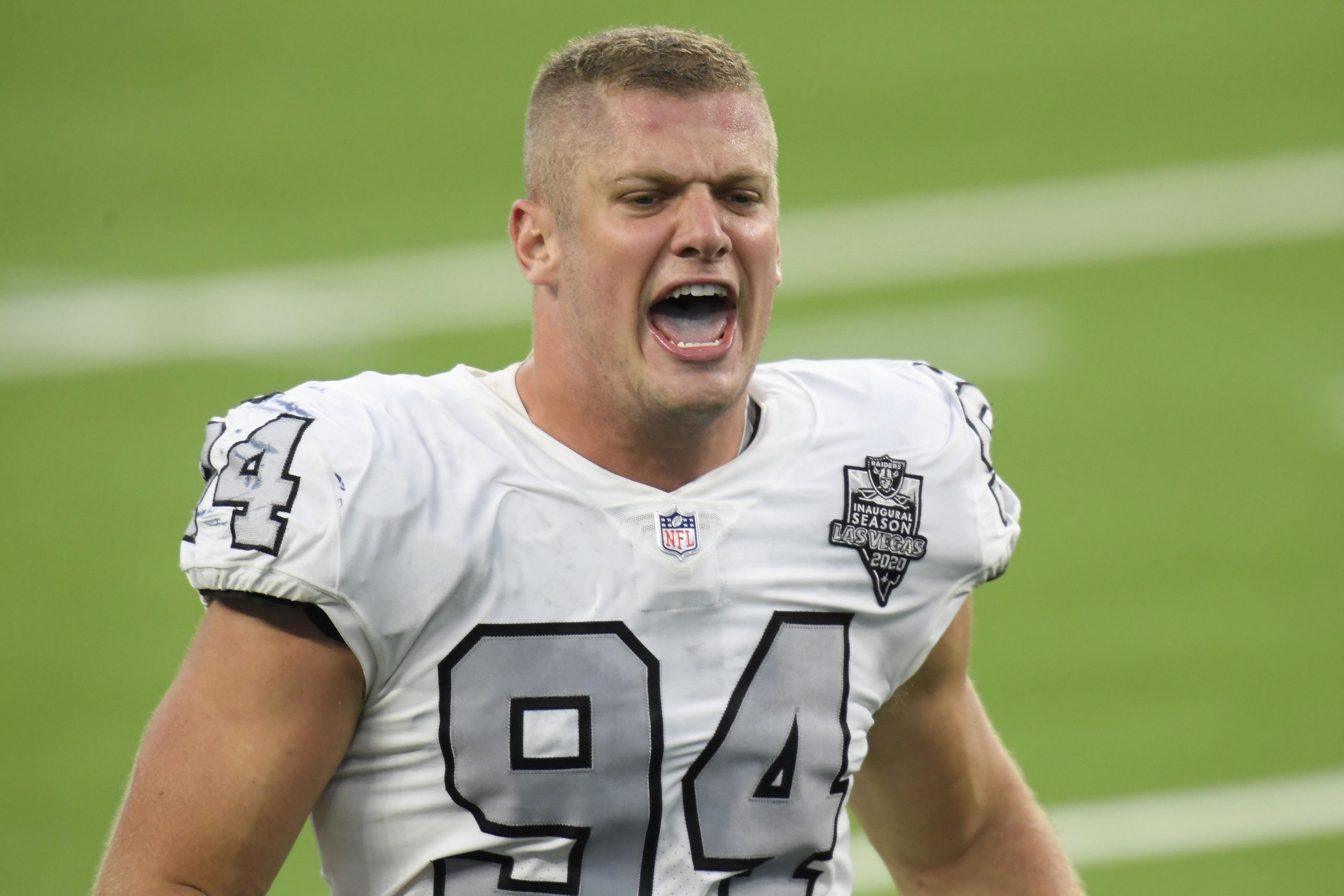Photo by Harry How via Getty Images.
For Your Edification* is a weekly Slice of Culture series where staff writer Ed Daniel take topics — Hudson County or national news related — and provides social commentary.
By being himself, Carl Nassib now has made it easier for a lot of young people to be themselves. But is the NFL ready for the progress that comes along with it?
In an Instagram video last Monday, Las Vegas Raider defensive lineman Carl Nassib announced to the world that he is gay.
This is a historic announcement because in over 100 seasons of play, the NFL has never had an openly gay player.
There have been six former NFL athletes who came out after retirement. SEC Defensive Player of the Year, Michael Sam, was drafted by the St. Louis Rams in 2014, but failed to make the team. Nassib now will be the first openly gay player, and in the middle of his career, will have to navigate the hyper-masculine terrain of the NFL.
Nassib making this announcement puts him front and center for LGBTQ rights within sports, but there is also a huge risk in his revelation.
Nassib is a good rotational defensive end, but not a superstar. He has to fight for his spot on the depth chart every offseason. An injury or an off performance can result in him losing his position on the team.
The NFL culture is pretty inflexible.
They have a rigid system that praises uniformity and obedience. They are in general opposition to anything that brings attention to oneself, is a distraction to the team and the team is considered bad. So any individual who engages in a lifestyle that they don’t decree as customary can be deemed a distraction.
This is the same league that blackballed Quarterback Colin Kapernick because he spoke out against police brutality and owners across the league thought that his presence on the roster would alienate their mostly conservative fanbases.
Nassib announcing who he is could be deemed a distraction by NFL general managers and owners.
But my question is how much of this is due to the new generation of athletes being less sexually repressed and more tolerant of sexuality than the generations that came before?
I don’t think Nassib could have made this announcement in the 1990s and received the most universal support he received outside the football world.
During that time period, there was no gay marriage allowed in the U.S. and transgender rights were not mainstream.
Now, as as a society, we have vastly improved and the NFL made a statement in support of Nassib and the LGBTQ community — something they never did for Kaepernick.
This represents the overall change in discourse and potential progress in society, but sports are usually last when it comes to race for social progress in America.
Now male sports are entrenched with toxic masculinity, especially football.

Anyone who has played or been close to the game can recall the homophobic rhetoric used to motivate and enforce aggressiveness: “Don’t be a p***y!” “Stop being a sissy” and “Man up!”
These phrases are not just used by players, but by the coaches at every level.
Locker room talk is not the bastion for open minded and progressive discussions. A lot of people would find it appalling.
This kind of behavior is ingrained into athletes at a young age. It is a hostile space a young gay athlete.
In 2012, former San Francisco 49ers cornerback Chris Culliver made inflammatory comments regarding homosexuality in football just a few days before Super Bowl XLVII. He said on Arti Lange’s radio show:
“I don’t do the gay guys man, I don’t do that… No, we don’t got no gay people on the team, they gotta get up out of here if they do….Can’t be with that sweet stuff. Nah… can’t be …in the locker room man. Nah.”
Statements like these are presumably why it took Nassib until now to declare his sexuality despite the fact that he knew since his teens. It’s been ten years since Culliver’s comments and Culliver has apologized and received backlash for them.
I would like to think we have progressed past these viewpoints, but a lot of these attitudes still persist and it’s hard to change these entrenched beliefs that continue to get passed on despite the overall progress we have made so far.
No matter what happens to him in his NFL career, Carl Nassib has become a pivotal figure in the fight for LGBtQ rights. He has not only made himself a hero, but he has inspired others.
Former NBA player and current psychologist, consultant, and gay rights advocate John Amaechi had high praise for Nassib.
Amaechi, who came out as gay after his career ended with the Utah Jazz, made this statement on Dan Lebetard’s podcast about Nassib.
“This young man is a force for good. What he has done today — there is a young person watching him right now who has walked to school lighter. Even if they have disclosed nothing about themselves, they have walked to school with a greater sense of hope because of this young man. That is a good thing. That is a good thing.”
If you want Ed to tackle a specific topic please email hello@sliceofculture and edaniel@sliceofculture.com.


